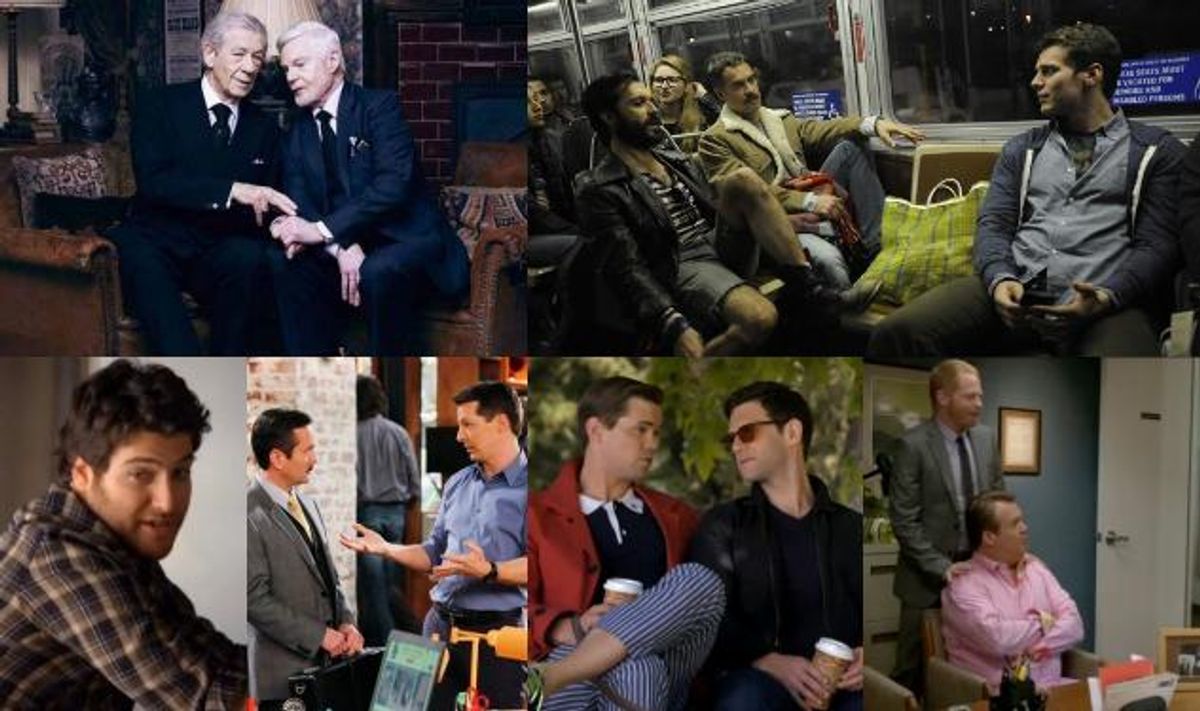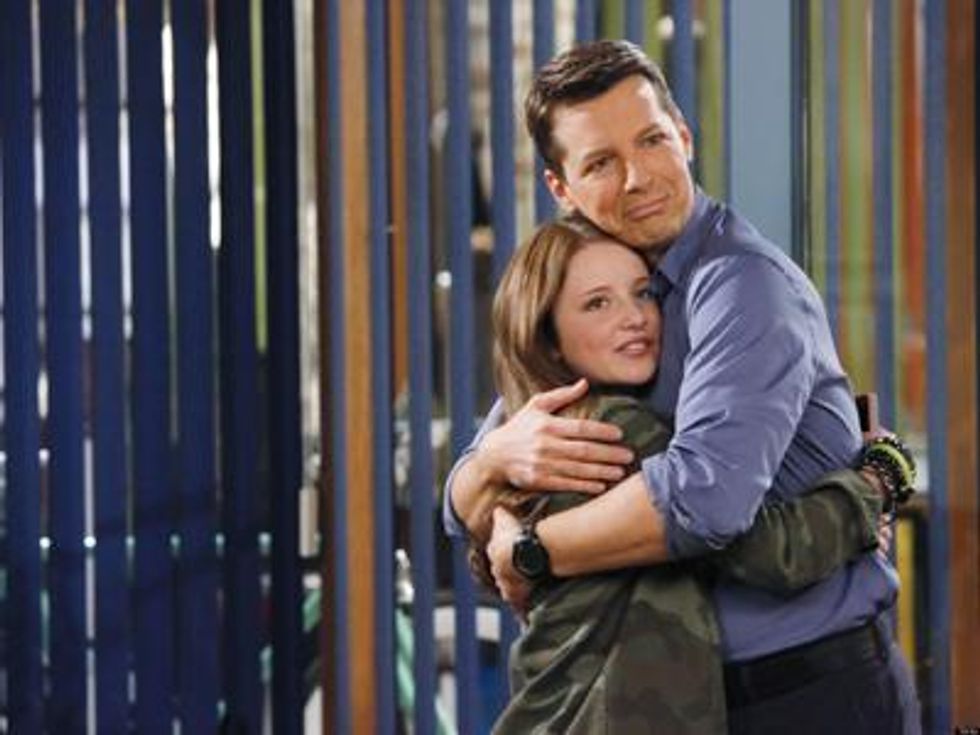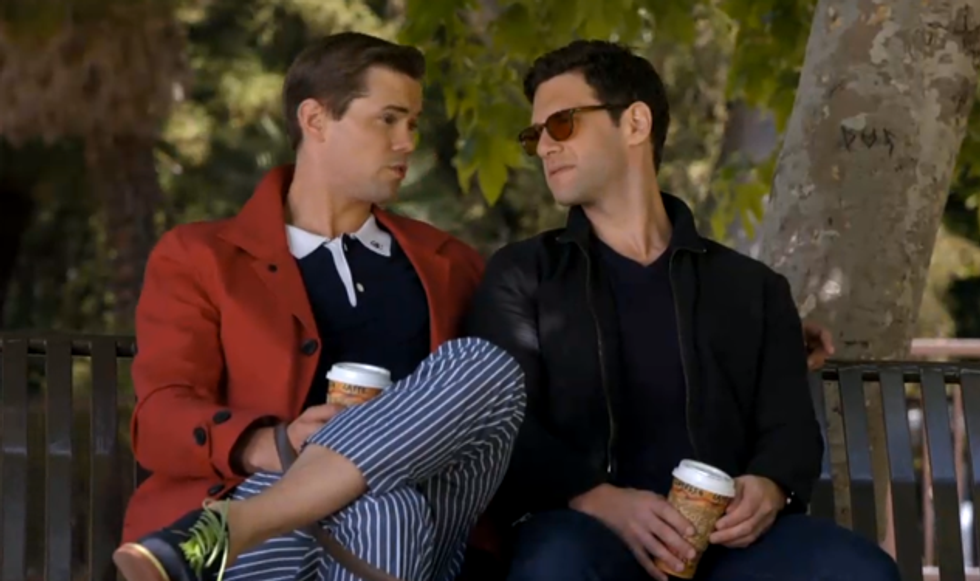
With another gay-themed sitcom canceled, we wonder: Are the gays just not funny anymore?
January 30 2014 10:42 PM EST
February 05 2015 9:27 PM EST
By continuing to use our site, you agree to our Private Policy and Terms of Use.

NBC has "halted production" on the beleaguered Sean Saves the World and that means another gay-themed sitcom bites the dust. Though not officially canceled, the show's low ratings and mixed critical reaction all but guarantee it will be joining The New Normal in gay sitcom heaven -- where the takes (and the cocktails) are always double. With the past two years seeing shows featuring prominent LGBT characters plucked off one-by-one as many gay, lesbian, bisexual, and transgender people in the real world attain increasing visibility, one must wonder: Is the joke on us? Are the gays just not funny anymore?

But while Jack may have been (perhaps unfairly) maligned for playing off gay stereotypes, at least he was funny. Sean Harrison, the Hayes surrogate from Sean Saves the World, is, for all his labels -- he's not just gay, he's a father, a son, a boss, a friend, a divorcee -- still boring as hell. Sure, Hayes had the occasional chance to display his superior comedic timing and physicality, but "Sean's" gayness was rarely used for laughs. The result was a character who may have been more realistic, more three-dimensional, but you didn't want him in your living room every Thursday night.
That's not to say, much like one wrongheaded Esquire writer posited last week: that gays are now too boring to be funny. In his assessment of HBO's Looking, Mick Stingley took especial issue with the show for giving us characters who weren't "funny, mincing guys with witty one-liners and put-downs." The piece was an "attempt at humor" that fell unflatteringly flat. But Looking, a dramedy that's more like Girls in tone than Sean Saves the World, represents a major step forward, with its frank depiction of sex and romance among a group of friends in San Francisco. It features three gay male protagonists, 15 years after Will & Grace debuted two gay male protagonists. But how far have we come since then?

But Sean Saves the World wasn't "too gay." It just wasn't funny. Its attempts at broad comedy fell flat, as did its reworkings of age-old sitcom tropes: an overbearing boss, a slutty best friend, an overbearing mother, misunderstandings on top of misunderstandings on top of misunderstandings. The ghost of Paul Lynde was no doubt doing a spit-take in his grave. The show's reliance on a multi-camera format only made it seem like more of a relic from a bygone, slap-stickier era, much like CBS's short-lived gay bromantic comedy, Partners, from Will & Grace producers David Kohan and Max Mutchnick. That turkey was done before it even came out of the oven.
On the other, comically oversized hand, ABC's late, great treasure Happy Endings embraced and subverted gay stereotypes through noted sloppy bromosexual, Max. Along with Modern Family, it was heralded among a class of new sitcoms that were reinvigorating the genre. Here was a gay-themed sitcom that was actually funny; that critics loved; that audiences...well, it held on for as long as it could. Since being canceled the show has attained cult status, but it did manage to log in three seasons; two seasons longer than the other comic casualties mentioned earlier.
Happy Endings also skewed to a younger audience -- having kids, surrogate or otherwise, was the furthest thing from anyone's mind -- which may have contributed to its relative success. Younger audiences are more likely to accept and embrace LGBT characters and issues; but how does that explain the success of Jenny, the openly lesbian train wreck on Two and a Half Men on CBS -- official network of the AARP? The character's inclusion on the long-running Sheenless sitcom led Slate to label it one of the most "queer-friendly shows on television." This from the network which has consistently come in last place in GLAAD's annual report on the visibility of LGBT characters on TV.
Last year, however, NBC brought up the rear on the "Where We Are on TV" report, where it will likely remain thanks to the cancellation of Sean Saves the World. In a crowded TV landscape, LGBT characters seem to be getting pushed out of the spotlight, but there are still many notable gays to be found on the small screen. Fox's breakout hit Brooklyn Nine-Nine features a rarity on network TV -- a black, middle-aged, married, openly gay man -- as its police captain, portrayed by Andre Brauer; there's the aforementioned Modern Family; USA's new comedy Sirens from Denis Leary will also up the diversity with an openly gay black EMT played by Kevin Daniels; there's also Cameron Monaghan's Ian Gallagher from Showtime's Shameless; Kurt, Blaine and Santana are still clinging to that sinking ship known as Glee; NBC may be able to redeem itself with a new sitcom produced by super-lesbian Ellen DeGeneres and 2 Broke Girls' openly lesbian writer Liz Feldman. And then there's Chozen.
The animated FX comedy about a gay white rapper, the titular Chozen, is hands-down the gayest show on TV. Each episode is replete with the libidinous lyricist making not-always-unwelcome sexual overtures to any number of dudes. It's as if Looking went on Adam4Adam then scored a menage with Noah's Arc and Queer as Folk. And it's pretty funny, too.
Plenty of funny gays exist on TV, however, audiences are not always ready to embrace them, and networks sometimes just don't give them enough of a chance. ABC all but threw Happy Endings to the slaughter in its third season, and The New Normal may have found its footing if given a second season. The fact that writer/producer Gary Janetti (Family Guy, Will & Grace ) was able to create Vicious in the UK--starring seventysomethings Ian McKellen and David Jaobi as a longterm gay male couple--and it will begin airing stateside on PBS this summer is also something of a potential breakthrough. When was the last time you saw a couple of older gay gentleman crackwise on TV? NEVER.
TV is supposed to be a reflection of our lives and the gays ain't goin' nowhere. So it's up to writers and showrunners to figure out how to portray us as complex characters without treading so softly as to eliminate any traces of humor. After all, being gay is funny. Just like being black is funny. Being Jewish is funny. Being a delusional cater-waiter with an Off-Off-Broadway one-man show is funny. There's comedy to be found in all of life's experiences. And it's what makes life bearable. Now if we can only find something for poor Megan Hilty. After Sean Saves the World and Smash, girl can really use a break.
Want more breaking equality news & trending entertainment stories?
Check out our NEW 24/7 streaming service: the Advocate Channel!
Download the Advocate Channel App for your mobile phone and your favorite streaming device!